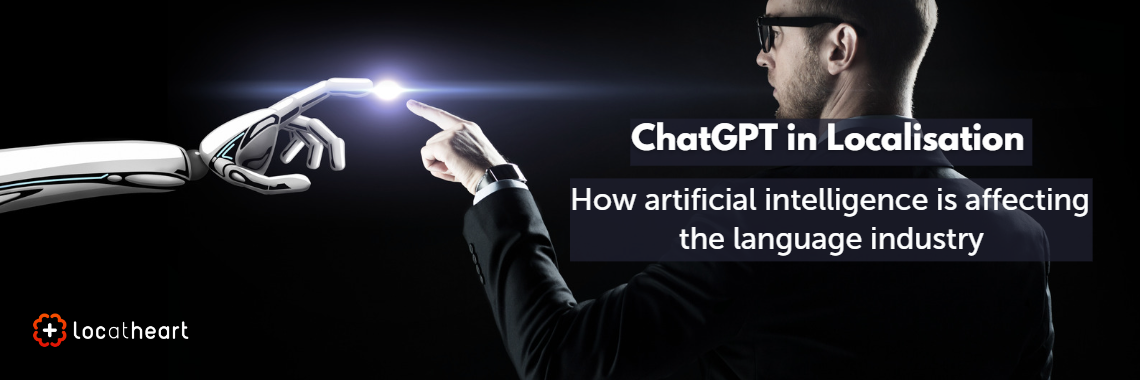How artificial intelligence is affecting the language industry. Summary of the “Chat GPT in localisation” conference
Since its public launch in November 2022, OpenAI’s ChatGPT has caused quite a stir and provoked a number of debates among intellectuals, businesspeople, and general public. A ripple of anxiety could be felt in several industries. Witnessing new developments brought forth by the emergence and availability of a new AI-based technology, localisation and machine translation experts at Custom.MT decided to strike while the iron was still hot. They organised a special conference to discuss the pros and cons of using ChatGPT, as well as to present future applications of artificial intelligence in the language industry. Several panels tackled different aspects of AI utilisation.
You can read in detail about each of them here, here, here, and here. Below you will find key takeaways from the event, along with closing comments from Renato Beninatto, a respected entrepreneur and a researcher in the field of localisation.
“Everybody’s talking about ChatGPT. There are a lot of things that are changing,” said Beninatto. “Some of us are excited, some of us are scared – he continued – but it is clear that we are all impressed […], not just the professionals in the language industry, but the whole world. ChatGPT is impacting every aspect of business life.”
A step forward or a revolution?
While recognising the innovative status of this new technology, Beninatto wondered whether it’s an incremental innovation, i.e. something that is going to improve the way localisation is done today, or if it’s a disruptive innovation, i.e. something that radically redefines the way language agencies and content providers operate. He assumed that it’s feasible that ChatGPT will be considered a bit of both, because years of observing the industry led him to believe that “we embrace everything that is new, […] and [all] these new technologies, ideas, new processes, new methods co-exist for a long time with the ones that were in place before.”
Other speakers and panellists seemed to share Beninatto’s sentiments. Some, like Olga Beregovaya, quickly emphasised that ChatGPT is not a miraculous all-in-one solution and works best as an integral part of a larger Translation Management System. A point was made about inferior translation capabilities of ChatGPT, while at the same time its content generation and optimisation abilities were praised. Frederik R. Pedersen ventured to say that artificial intelligence may replace native speaker translators because one potential change in the industry would be to shift from translating content to creating different content for each desired language.
ChatGPT is sprawling out
A different matter of concern for Beninatto would be the time necessary for the adoption of this new technology. One hundred million users were counted for ChatGPT in the first two months since its premiere, a record number, no doubt, but there are still people who have not tried ChatGPT at all. For Konstantin Dranch, one of the organisers, that was exactly the motivation behind arranging the event:
“to make [this technology] more familiar to people so they will feel this is the right time to start trying [new things] with it and not give it away to IT people.”
Human agency and human concerns
The panellists shared the opinion that human intervention will be paramount. Even when AI is adequately instructed, its outputs need to be supervised by humans for a couple of reasons. The strength of ChatGPT is the uncanny ability to tirelessly produce new texts or different variants of a source text, and while it can shape or reshape content to fit a particular style, tone or business goal, a flesh-and-blood writer needs to apply a finishing touch to elevate the text a level above and make it truly original (if originality is something that’s needed). There’s also the issue of AI “hallucinating”, e.g. filling the text with “made-up”, incorrectly generated, false information. Therefore, fact-checking of AI output will also remain a human responsibility.
Language services redefined
Beninatto reflected on the possible scope of changes provoked by the implementation of ChatGPT. “Is it going to change how we are paid? Is this going to change how we deliver? Is this going to change how we think about the product that we do? I don’t know yet,” he pondered. Other participants were less uncertain about this evolution and already had some concrete ideas. Pedersen focused on the shift from translating content to using AI for creation of guideline-compliant original content tailored to particular languages or markets. For Beregovaya, the advent of AI in creative industries meant that a translation agency can take over the content creation process from start to finish, and become a fully-fledged content creation partner for its clients. This would also mean a change in the way language services are priced.
Europe in the AI race
A separate research panel was devoted to European artificial intelligence solutions. Beninatto reiterated the message coming from the panellists who stressed that it’s important for Europe to develop its own technology, so Europeans don’t get overwhelmed and overtaken by the Chinese and the Americans who are leading the research in the field right now.
“If you want to [play] a part in this geopolitical game, you have to take position right now,”
urged Ariane Nabeth-Halber. She also advised caution when selecting a specific large language model. One needs to consider the data sets that were used to train a particular model and ask oneself what is inherited in the content generated by, let’s say an American, LLM. Alternatives to ChatGPT already exist, but Beninatto noted that it’s clear they are not as easy to use, nor as freely available as OpenAI’s chatbot. These two qualities contribute to transformational power of this technology. The researcher found analogies between the development of AI and the development of internet search engines.
New technology, old fears
Another common thread permeating all the presentations was the potential issues of governance, security, and privacy. While important, concerns of this type are nothing new and the same topics reappear every time a new technology enters the industry. Beregovaya drew attention to the fact that similar reservations were voiced previously, when machine translation was first introduced. Most of them were put to rest with service provision agreements between agencies and technology providers, so same thing might happen with AI. Diego Cresceri expressed his view that perhaps we worry about issues like privacy too much, at least in some scenarios. Beninatto went even further in his assessment of the situation and suggested that solutions to these won’t come from LSPs, and they shouldn’t be concerned.
“The people that should think about these things are going to think about these things and are going to solve them. For us, the world at large, [this is not something] we worry about. It’s not our problem, it’s somebody else’s problem. I’m talking [from the perspective of] a translator and [an] LSP.”
The future with AI, the future of AI
Marco Trombetti painted three scenarios for the future of the industry and different approaches to AI application. In the first scenario – akin to Pedersen – he foresees more engagement in copywriting (in the target language) and less in translation.
“You’re losing money if you’re translating, you’re getting more money if you’re copywriting.”
Another possible application would be to restructure content, e.g. by creating summaries or reorganising texts. In this scenario demand for translation actually grows. In the third scenario more content is produced in general, including a lot more machine translations and more AI-assisted human translations. In this scenario AI software is used to support the translators and copywriters. Costs related to using both decrease. Beninatto, however, remained sceptical and reminded everybody about the Segway – seemingly a revolutionary two-wheeled personal transporter that held a lot of promise which never materialised. Some technologies can be very disruptive, or very innovative, but in the end they don’t get to be fully adopted.
Only time will tell how successful ChatGPT is going to be. Beninatto was confident that in the upcoming months a plethora of competitors will emerge to enter the lists and challenge OpenAI’s invention with their own. He also felt it necessary to remind people that with at least 800 different solutions in the translation industry,
“you need people to decide, to moderate, evaluate available tools, and nobody has the single answer to all the problems, ”
he said, and continued:
“we are going to [find ourselves] in the same dazed and confused state we are [in whenever] we have to make a choice on the new language technology.”
The AI playground
Beninatto deemed it important to keep in mind the always relevant Amara’s Law: “We tend to overestimate the effect of a technology in the short run and underestimate the effect in the long run.” Whatever our predictions are, they are probably wrong, but at the same time people shouldn’t be afraid to try the new technology and start experimenting with it. That was the most important message from the researcher. “Don’t get stuck with [ChatGPT], and don’t get stuck waiting for something else to happen. Just try [it], play [with it], it’s very simple,” he encouraged. While it might be obvious to compare it to machine translation, just don’t do it, it’s not what it is designed for. LLMs can be used to improve productivity, to take away some generic or bureaucratic tasks, to find inspiration, but not as a replacement for methods and processes of doing translation today. The researcher stressed that using CAT tools with machine translation integrated into it at this stage is more productive than relying solely on ChatGPT.
All aboard
In his closing statements, Konstantin Dranch observed the tremendous speed of AI developments and the way it’s impacting the market and our reality. That’s why the conference itself was organised without delay. “People were telling us, ‘Let’s do it one month from now, we need to prepare the audience.’”, he reflected. But Dranch was very adamant: “No! [Let’s make it happen in] 2 weeks, let’s go! There’s no time. [The] wave is here and we must ride it.” The new technology has arrived and now is the perfect time to test it and to grow the business accordingly.
Source: Custom.MT, ChatGPT in Localization. Online event, 1 March 2023: https://www.youtube.com/watch?v=jM91CdLXuog






Leave a Reply